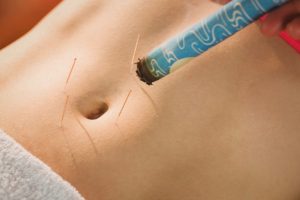Treating Premenstrual Syndrome Symptoms
Acupuncture Treatment for PMS
Even though many people use PMS as the punchline of a bad joke (you know who you are), it’s been a recognized medical condition for over 2,000 years. In the days leading up to their period, millions of women experience one or more of the 150-plus symptoms associated with PMS. These range from psychological symptoms that include depression and loss of energy to physical ailments such a headaches and abdominal pain.
Many of the women who experience PMS every month turn to medications to manage their symptoms. There are safer, natural alternatives. A holistic approach that includes acupuncture and a healthy diet and exercise program helps balance hormones and promote healing.
What Is PMS?
 PMS is something nearly everyone has heard of, yet few people seem to truly understand it. It’s a punchline in a sitcom or an insult tossed at a woman whenever she fails to smile. In reality, PMS encompasses a wide range of symptoms that millions of women experience every month. Researchers believe it begins shortly after ovulation and continues until the period begins, lasting around 7 to 10 days.
PMS is something nearly everyone has heard of, yet few people seem to truly understand it. It’s a punchline in a sitcom or an insult tossed at a woman whenever she fails to smile. In reality, PMS encompasses a wide range of symptoms that millions of women experience every month. Researchers believe it begins shortly after ovulation and continues until the period begins, lasting around 7 to 10 days.
Most women who experience PMS say their symptoms are mild. Common complaints include:
- Anxiety
- Backache
- Bloating
- Breast tenderness
- Changes in appetite
- Cramping
- Depression
- Feeling tired
- Headache
- Irritability
Researchers Prove Acupuncture’s Effectiveness in Treating PMS
Since the early 2000s, there have been 19 scientifically recognized studies conducted to determine whether acupuncture and herbal medicine are effective in treating PMS. The results? A resounding, “Yes!”
According to one study, women receiving acupuncture treatment experienced a 77.8 percent reduction in symptoms compared to 5.9 percent in the placebo group. These findings strongly encourage a holistic approach to treating premenstrual syndrome.
Why Does Acupuncture Work for PMS?
Although no one knows the exact cause of PMS, most healthcare professionals believe it is related to the hormonal changes women experience throughout the menstrual cycle. It is this imbalance that causes symptoms. And, it is this imbalance that acupuncture seeks to correct.
Acupuncture and PMS
 In Traditional Chinese Medicine (TCM), PMS symptoms are caused by disturbance in qi and blood due to imbalance in the kidneys, liver, and spleen.
In Traditional Chinese Medicine (TCM), PMS symptoms are caused by disturbance in qi and blood due to imbalance in the kidneys, liver, and spleen.
Signs of blockage in the liver qi include bloating, irritability, and spotting. TCM tells us that liver qi stagnation causes a heavier menstrual flow coupled with angry mood, greater thirst, and constipation. The acupuncturist focuses treatment on the liver qi to relieve symptoms and stimulate the body’s natural healing properties.
Acupoints vary according to the individual’s symptoms. A good acupuncturist asks about your symptoms to help design the ideal treatment.
Although patients often feel relief after a single session, the recommendation is monthly sessions for three months to fully address the patient’s hormone imbalance.
Traditional Chinese Medicine explains that treating the liver qi blockage is what relieves the symptoms of PMS and restores balance in the patient.
Other Natural PMS Treatments
In addition to acupuncture, your provider should talk to you about maintaining optimum health through proper diet and exercise. The foods we eat play a significant role in our overall health, including hormone balance. Exercise, also, helps improve circulation, mood, and much more.
Your acupuncturist may also discuss herbal remedies with you, particularly xio yao wan, which is good for treating liver qi blockage.
If you have questions or would like to book an appointment, contact Accurate Acupuncture today.
